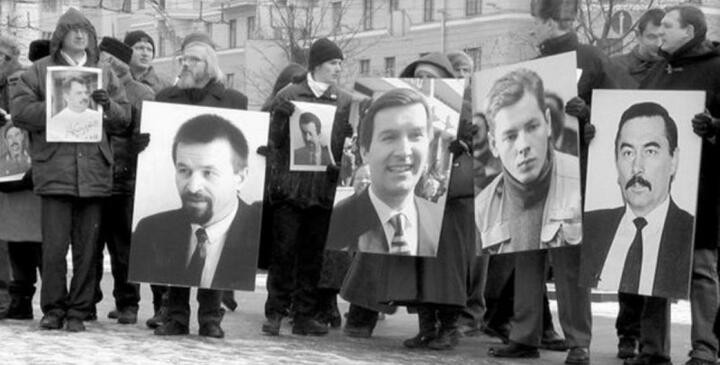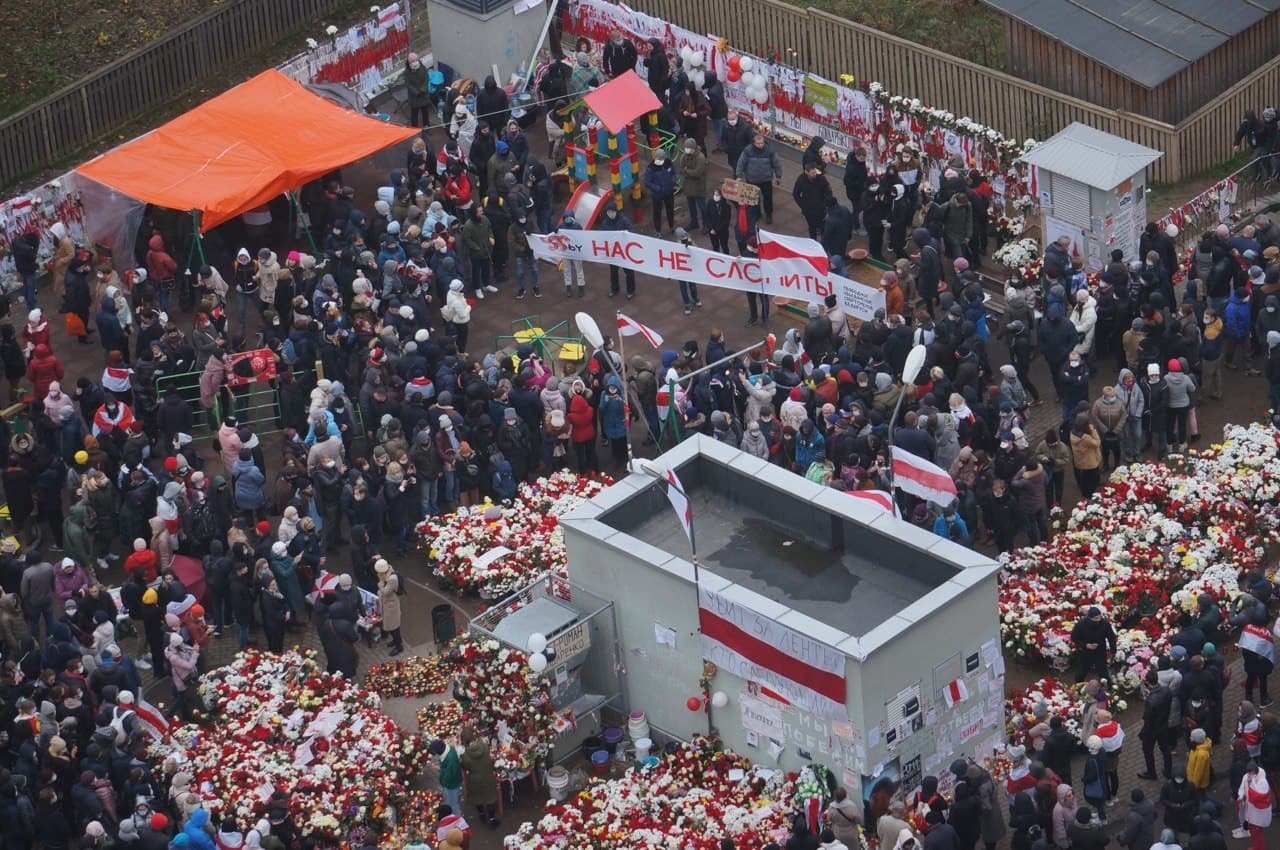Взаимопомощь и солидарность - это то, что мы можем прямо сейчас
Осень вступает в свои права: желтеет трава и листья, природа и жизнь замирает, готовясь к зиме. Солнечные дни всё короче, а настроение так и норовит скатиться куда-то в меланхолию и печаль. Тем более, что существенных позитивных сдвигов не наблюдается ни в регионе, ни в нашей стране.
Осень вступает в свои права: желтеет трава и листья, природа и жизнь замирает, готовясь к зиме. Солнечные дни всё короче, а настроение так и норовит скатиться куда-то в меланхолию и печаль. Тем более, что существенных позитивных сдвигов не наблюдается ни в регионе, ни в нашей стране.
Однако, всё выглядит подобным образом лишь на первый взгляд. Сегодня мы поговорим как раз о том позитивном, что может привнести немного света в окружающую действительность, которая в основном состоит из тягучего киселя сменяющих друг друга кризисов. А именно о солидарности.
На протяжении всей истории независимой Беларуси в стране наблюдалось противостояние авторитаризма, диктатуры и попрания прав человека с одной стороны и свободы, независимости и демократии - с другой. Порой данное противостоянии принимало поистине ожесточённые формы, в нём всегда были свои герои, злодеи и огромное количество жертв. Каждая небольшая победа демократии и оппозиционных режиму Лукашенко сил чаще всего встречала настоящее цунами реакции, иногда сметающее достигнутые вершины свободы. Мы можем вспомнить многочисленные столкновения с режимом, чаще всего приуроченные к выборам президента в стране, когда объединённые оппозиционные силы шли в лобовое противостояние с вооружёнными бандитами на площадях столицы и не только. Известно, чем заканчивались все подобные баталии - десятки уголовных дел, избиения, сломанные судьбы людей, пытки и даже убийства режимом неугодных.
 Акция, посвященная пропавшим журналистам и политикам
Акция, посвященная пропавшим журналистам и политикам
Время шло, и по разным причинам практики преследования несогласных в Беларуси всё ширились, а методы подавления восставших совершенствовались. Раз за разом массовые шествия, митинги, стачки и демонстрации разбивались о щиты карателей и уголовные сроки заводаторам протестов. Так неужели со временем вся политическая и гражданская жизнь в стране сошла на нет? Ни в коем случае! Свобода всегда находит пространство для того, чтобы пустить свои ростки. И на этом моменте хотелось бы обратиться к исторической справке касательно политического движения в стране, которое являлось, возможно, самым бескомпромиссным противником диктатуры - анархическое.
В момент, когда анархисты начали представлять собой настоящую политическую силу и фактически расцвели во всём многообразии различных активностей от свободных библиотек и образовательных кружков до радикальных бунтарей, общее пространство допустимой свободы в стране как раз схлопывалось окончательно. Большинство крупных партийных объединений изжили себя, превратившись в небольшие кружки доверенных лиц, чаще же - просто инфильтрованные агентами КГБ структуры. Политическая и гражданская жизнь представляла собой редкие всплески ситуативных протестных акций, которые являлись ответом на слишком очевидные наступления режима на права граждан, например, протест против “декрета о дармоедах”. Отчего же в это самое время начинают как грибы после дождя появляться различные анархические объединения и кружки, способные в критический момент не только дать отпор карателям на уличных акциях, но и возглавить митинги и манифестации? Ответ кроется в той структуре, в рамках которой происходило сотрудничество между членами движения. Если быть точнее - бесструктурности.
Анархисты всегда придерживались тактики аффинити-групп, которые формировались из близких друзей, знакомых и проверенных ребят. Такие группы насчитывали за редким исключением до 10 человек и занимались чётко определённой для себя деятельностью. Те, кто собирался заниматься образованием, читали книги и организовывали независимые, открытые пространства и библиотеки радикальной мысли, иные же учились мешать коктейли молотова и обязательно бегать, ведь “делай добро и беги” никто не отменял. Данные группы невозможно было инфильтрировать агентами режима, их невозможно было контролировать, невозможно уследить за всеми, а репрессии в отношении части движения не могли уничтожить его целиком. Общность интересов и желание противостоять главному врагу позволяла в случае необходимости производить не только мобилизацию собственных сил, однако и включать или включаться в массовые акции в составе общего оппозиционного фронта. Это достигалось за счёт кропотливой работы по налаживанию сетей коммуникации с представителями всех существующих деятельных противников диктата Лукашенко. Но оставим летописи и перенесёмся в август 2020 года и последующие месяцы.
На лицо был тот факт, что в экстремальных ситуациях даже незнакомые друг с другом люди способны вступать в коммуникацию и даже сотрудничество. Потерпев поражение в очередном лобовом столкновении с тренированными и экипированными убийцами режима, беларусы перешли к более долгосрочным и устойчивым тактикам противостояния. Тогдат люди впервые осознали, как много у них общего, в том числе желание перемен в политической жизни, а многие буквально впервые познакомились с соседями на лестничной клеткке, укрывая друг друга от рейдов обезумевших подонков в обмундировании. Самообразовавшиеся на данном этапе объединения месяцами противостояли каратетельным экспедициям силовиков режима, поддерживая друг друга, пострадавших от репрессий и продолжая организовывать протестные акции. Это было начало довольно продолжительной фазы беларуской революции, которая в основе своей опиралась на горизонтальные связи между людьми и сообществами.
 Акция памяти на месте убийства Романа Бондаренко
Акция памяти на месте убийства Романа Бондаренко
Многие из таких объединений положили начало целым сообществам противников режима в эмиграции, кто то остался и продолжает тихую, но очень важную деятельность, многие ждут момента, чтобы вновь протянуть эти сети солидарности и взаимопомощи по всей стране.
И вот мы тут, осенью 2023 года,подавленные бесконечным потоком репрессий из Беларуси, погрязшие в ужасах новостей из Украины, не совсем понимающие, что нам делать. Мы поделимся своим видением, что делаем мы, и может быть это станет ответом на многие важные вопросы. Мы (правозащитные организации, гражданские активисты, фонды помощи и различные инициативы) уже давно только и делаем, что живём в паутине. Именно в паутине. Прежде всего, большинство из нас осознали, что в одиночку и даже относительно большими группами нам будет сложно противостоять машине государственной системы, чьей целью поставлено уничтожение прав и свобод. Потихоньку мы выходили из тени и пытались разглядеть в окружающем мраке таких же, как мы сами. Их оказалось очень много. Мы поняли, что мы разные: у нас разное видение и методы, цели наши тоже могут отличаться, однако общность принципов и ценностей очевидна. Тогда мы решили не строить огромную организацию-улей для всех, где роль каждого и каждой свелась бы к роли рабочей пчёлки, а всеми преференциями пользовалась бы небольшая группа трутней. Нет, мы решили создать паутину, наладить связь, которая лишь указывает направление и даёт некоторую поддержку.
Буквально это работает как если бы кто-то нуждался в помощи, он просто тянет за ниточку, дёргает за неё, и те, кто рядом, уже готовы помочь и подсказать, или отправить это сообщение по нашей общей паутине дальше. Ведь где-то в ней точно найдётся тот или та, кто сумеет помочь. Да, у нас тоже бывают проблемы и недопонимания, ведь этот мир не идеален. Среди нас прямо сейчас находятся неповоротливые эгоистичные жуки, которых интересует лишь количественный показатель и кто неловкими движениями иногда портит филигранный узор нашей общей солидарности. Но мы учимся, учим других и продолжаем плести этот узор несмотря ни на что. Мы уверены, что многие из вас точно соприкасались с раскинутыми нами сетями и, возможно, являются полноценными партнёрами в общем деле. Ведь если нет - у вас прямо сейчас есть эта возможность. Просто свяжитесь с кем-то из нас, подумайте чем вы можете помогать, или может какая помощь вам нужна - в этот момент вы уже с нами, полноценный участник/ца распространения солидарности, уважения к правам человека.
Мы не знаем, какой именно из примеров горизонтального равноправного сотрудничества оказался понятен более всего, что бы вы посчитали наиболее действенным сегодня или завтра, но мы уверены, что как раз сейчас самое время попробовать. Находясь в Беларуси формировать группу единомышленников и просвещать людей, получать навыки для тех или иных акций с соратниками и соратницами, волонтёрить в рамках правозащитной организации или инициативы, зарегестрировать фонд помощи пострадавшим в эмиграции или просто на постоянной основе или ситуативно помогать людям - можно выбрать что угодно. Нам нужно всё. Давайте сплетать солидарность вместе!

